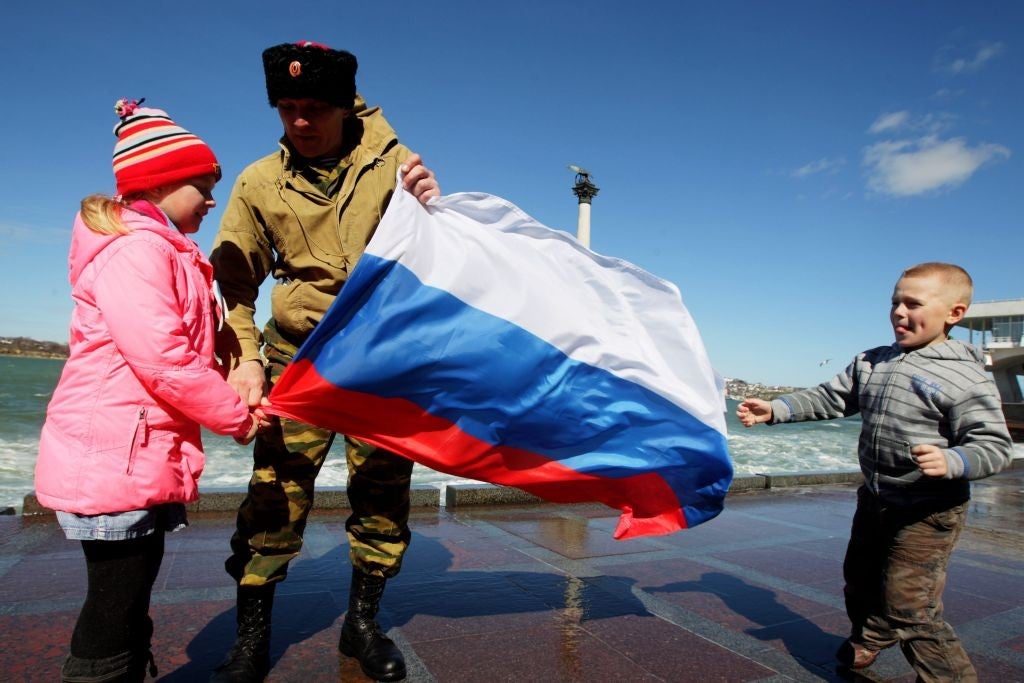Ukraine crisis: Crimea tensions escalate as US and EU impose sanctions on Russia
EU expected to target figures closer to President Putin in coming days

Your support helps us to tell the story
From reproductive rights to climate change to Big Tech, The Independent is on the ground when the story is developing. Whether it's investigating the financials of Elon Musk's pro-Trump PAC or producing our latest documentary, 'The A Word', which shines a light on the American women fighting for reproductive rights, we know how important it is to parse out the facts from the messaging.
At such a critical moment in US history, we need reporters on the ground. Your donation allows us to keep sending journalists to speak to both sides of the story.
The Independent is trusted by Americans across the entire political spectrum. And unlike many other quality news outlets, we choose not to lock Americans out of our reporting and analysis with paywalls. We believe quality journalism should be available to everyone, paid for by those who can afford it.
Your support makes all the difference.US President Barack Obama and the EU imposed travel bans and asset freezes on 21 people linked to unrest in Ukraine in the first significant moves aimed at isolating Russia in the aftermath of yesterday's referendum in Crimea.
In moves aimed at punishing Russia following its handling of the crisis, European Union foreign ministers imposed the sanctions on 21 people they have linked to the push for the secession and possible annexation of Ukraine's Crimean peninsula.
It is thought the number of those targeted will expand in the coming days to include figures closer to President Vladimir Putin.
The moves are likely to inflame diplomatic tensions between Russia and the West. In a phone call on Sunday, Obama and Putin clashed over the referendum, with the Russian leader reportedly telling his US counterpart that the recognition of the former Yugoslavian territory as a sovereign state in 2008 established a legal framework for secession that could be repeated by other separatist movements.
The sanctions came hours after Crimea's parliament declared the region an independent state, following its residents' vote to break away from Ukraine and seek to join Russia.
Two diplomats said the sanctions targeted 13 Russians and eight people from Crimea, according to the AP news agency. The diplomats spoke on condition of anonymity because the breakdown of the nationalities had not been officially announced.
The ministers, meeting in Brussels, did not immediately release the names and nationalities of those targeted by the sanctions.
In the US, an executive order issued by President Obama revealed sanctions against seven Russian government officials.
The United States also said it had identified and targeted the assets of other individuals who weren't government officials but were supporting them.
The Treasury Department also is imposing sanctions on four Ukrainians, including former President Viktor Yanukovych and two Crimea-based separatist leaders.
In Brussels, after a meeting lasting around three hours, the EU's 28 foreign ministers agreed on a list of those to be sanctioned for their part in Russia's seizure of Crimea and Sunday's referendum on joining Russia.
The ministers had "just agreed on sanctions - travel restrictions and assets freeze against 21 officials from Ukraine & Russia," Lithuanian foreign minister Linan Linkevicius wrote in a message on Twitter.
He said more measures would follow in a few days, when EU leaders meet for a summit in Brussels. They are expected to expand the list to include more senior figures closer to Russian President Vladimir Putin.
The referendum has been branded a "circus" directed at gunpoint by Moscow by Ukraine's new government in Kiev. Putin, however, insisted it was conducted in "full accordance with international law and the UN charter" and cited Kosovo's independence from Serbia as its precedent.
Crimean officials said 97 per cent had voted to join Russia.
Following the vote, the region took steps to integrate its financial system with Russia's - including adopting the ruble currency - ahead of declaring itself independent.
The West does not recognise the referendum, saying it violates both Ukrainian and international norms. Moscow considers the vote legitimate and Russian President Vladimir Putin will address his parliament on the issue tomorrow.
Additional reporting by AP
Join our commenting forum
Join thought-provoking conversations, follow other Independent readers and see their replies
Comments